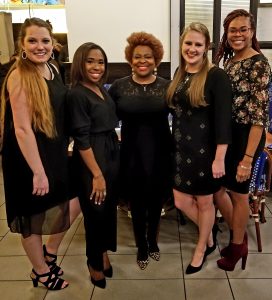Sherron Wilkes, an instructor in the School of Social Work at The University of Alabama (UA), and four UA social work students recently participated in the second annual SMART™ Student Health and Wellness Congressional Breakfast Briefing in Washington, D.C.
The congressional briefing was hosted Dec. 5, 2018, by the Hispanic Heritage Foundation, SMART’s multi-cultural advisor, and Ginn Group Consulting (GGC), architect of the Model, and was sponsored by CVS Health and Aramark.
 The Congressional Breakfast Briefing focused on the leadership and culture required to sustain SMART clinics, a transformative solution that is delivering dramatic outcomes for entire school populations in both urban and rural flagship sites, from grades pre-kindergarten to 12. First developed in Chicago, Illinois and later expanded to rural Alabama, SMART Student Health clinics are school-based health clinics created by Ginn Consulting Group and funded with support from CVS Health. The clinics aim to improve academic outcomes by promoting health and wellbeing for all students in schools.
The Congressional Breakfast Briefing focused on the leadership and culture required to sustain SMART clinics, a transformative solution that is delivering dramatic outcomes for entire school populations in both urban and rural flagship sites, from grades pre-kindergarten to 12. First developed in Chicago, Illinois and later expanded to rural Alabama, SMART Student Health clinics are school-based health clinics created by Ginn Consulting Group and funded with support from CVS Health. The clinics aim to improve academic outcomes by promoting health and wellbeing for all students in schools.
Wilkes, BSW student Alexandra Bolton, MSW student Kiana Winston, MSW student Candice Chandler and MSW student Kelly Breen joined members of Congress, Congressional staff, and multi-disciplinary leaders from the education, healthcare, and private sectors to hear the latest findings from Dr. Liza Cariaga-Lo regarding the nationally recognized SMART Student Health Model (School Health Model for Academics Reaching ALL Transforming Lives).
“I was honored to represent the School of Social Work,” Wilkes said. “I gained a wealth of knowledge about the SMART model.”
The first SMART clinics opened in Chicago, Illinois in 2013. This year, SMART clinics were launched in Pickens County, Alabama. Congresswoman Terri Sewell (D-Ala.), who attended the congressional briefing, supports SMART clinics in Pickens County, stating that they have “already had a profound impact on the lives of rural Alabama students’ health and related improved educational outcomes”. The new, rural SMART clinics in Pickens County, Alabama opened through a partnership with The University of Alabama and Dr. Julia Boothe, a physician in Reform, Alabama. The clinics are located in Pickens County High School and Reform Elementary School.
Undergraduate and graduate interns from UA’s School of Social Work provide behavioral health services to students through the SMART Clinics. Laura Hopson, associate professor of social work and director of the BSW Program, provides ongoing training and supervision to the social work students.
“Sherron was chosen to represent our school at the congressional briefing because of her expertise in partnering with local schools to implement school based behavioral health services and her many years of experience in social work education,” Hopson said.
Peter Hlebowitsh, dean of the College of Education at UA, recommends the institutionalizing of the SMART Model stating,
“When noting the evolution of the public-school system and its hallmark features, I can see the day when SMART Student Health and Wellness Centers are as normative within public education as cafeterias — one in every school,” he said.
Wilkes said the Congressional Breakfast Briefing was an opportunity to network and form new partnerships with the school.
“I have gained new community partners at Reform Elementary and The University of Alabama,” Wilkes said. “They have already invited me to visit their clinic and I plan to accompany Laura next semester. Our students were fabulous and very professional throughout the experience.”
About SMART
SMART was developed in Chicago in 2013, and the flagship SMART Student Health and Wellness Center at Sullivan High School has now entered its sixth year of operation. There, the Model has a tremendous track record of routinely consenting an average of 98 percent of the student population and providing care for 100 percent of those students, thus significantly increasing attendance by 3 to 4 percent, and improving the school’s academic metrics and rating, all at lower operational costs than traditional models. There are plans to expand SMART to other cities over the next five years.
[ua_row class=”row”][ua_col class=”col-md-4″]

[/ua_col]
[ua_col class=”col-md-4″]

[/ua_col]
[ua_col class=”col-md-4″]

[/ua_col]
[/ua_row]